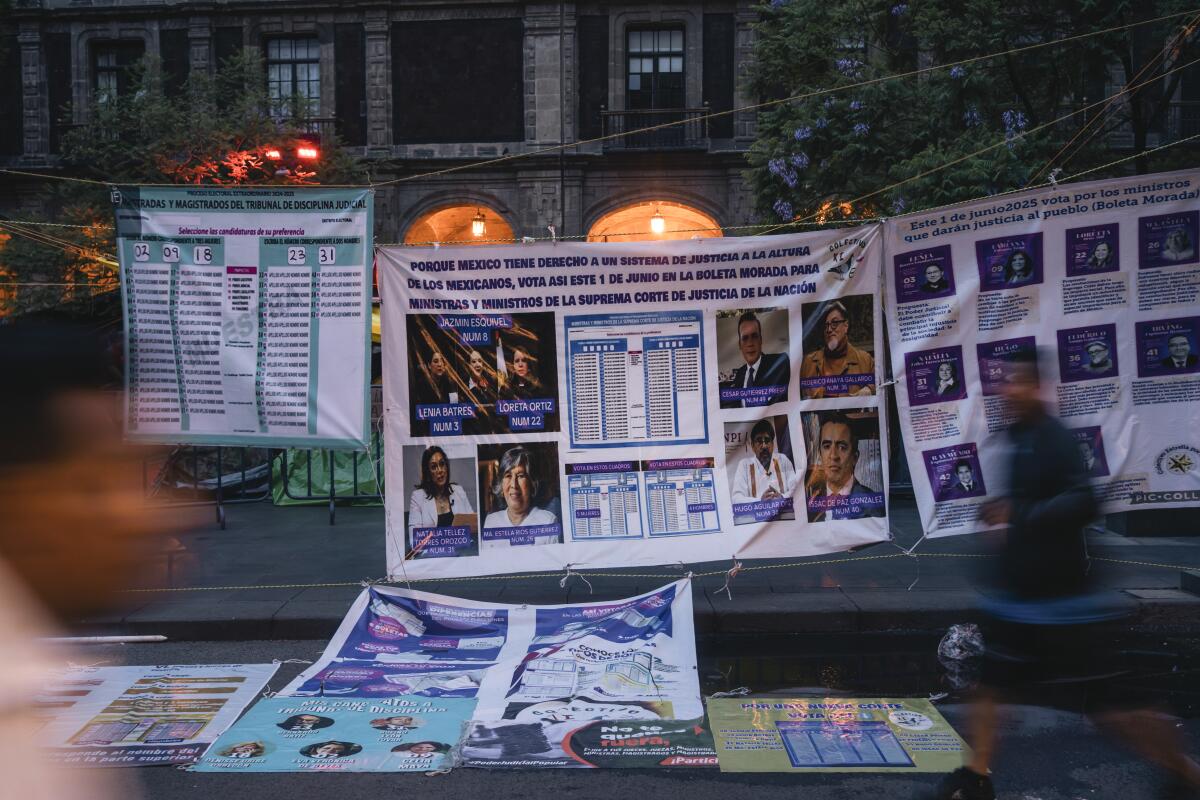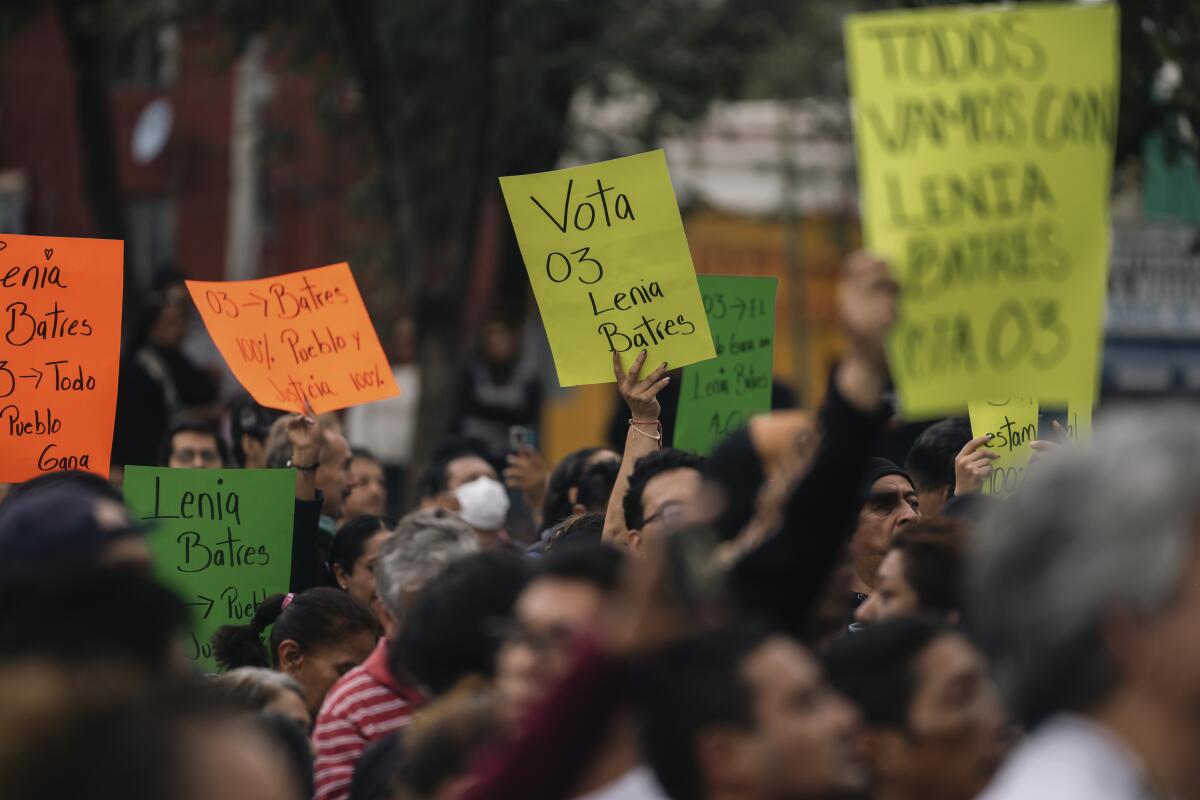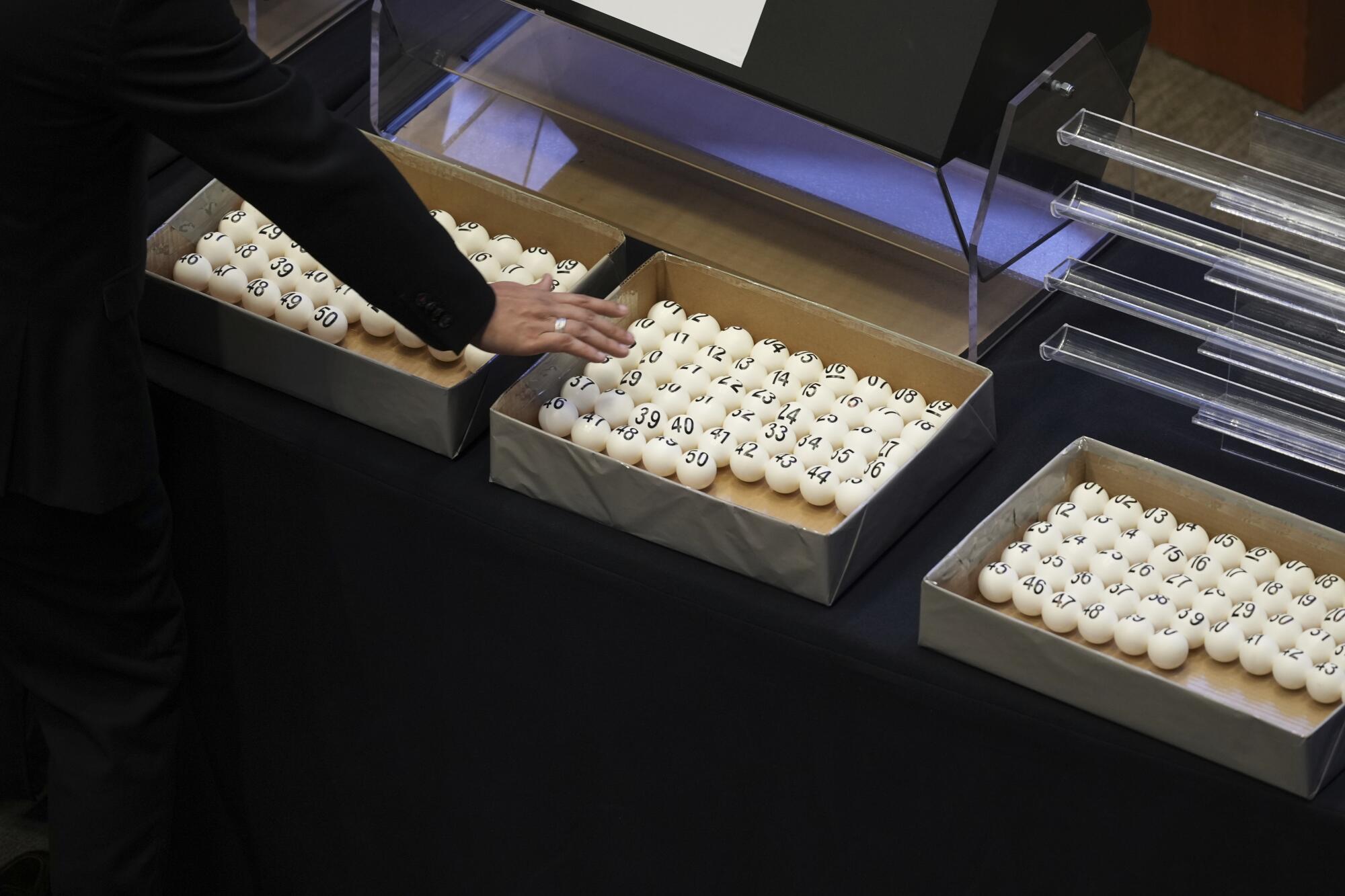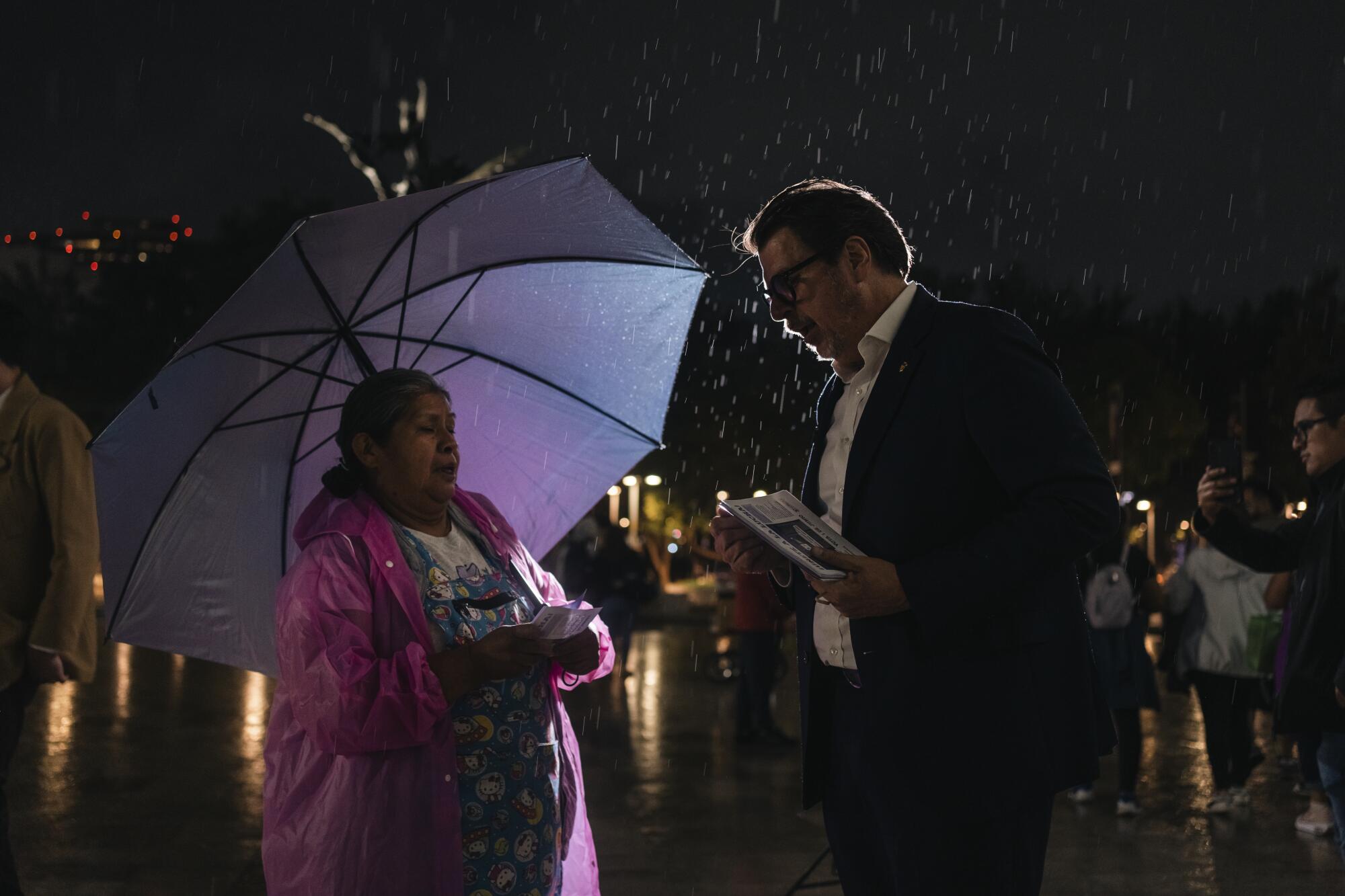
- Share via
- Judges in Mexico used to be appointed. Now all state and federal judges, including justices on the Supreme Court, will be elected.
- Mexico will become the first nation with an all-elected judiciary.
- Mexicans go to the polls to elect judges on Sunday.
MEXICO CITY — Hyper-democracy or ruling-party power play?
That is the question as Mexicans go to the polls Sunday to elect the country’s judges in a radical reshaping of the nation’s power structure.
At a time when many observers fear that President Trump is targeting judicial independence in the U.S., lawmakers here have opted to revamp the judiciary in a landmark — and extremely divisive — reform.
Mexico, which has never before voted for judges, will become the first country to have an all-elected judiciary.
The unprecedented vote has generated both widespread controversy and profound confusion as thousands of candidates vie for close to 900 federal judicial slots, including all nine on the Supreme Court.
Polls have shown that many Mexicans are both skeptical and apathetic— and have no idea whom to favor among the vast array of mostly unknown contenders, some with links to organized crime. At least one candidate served time in a U.S. prison for methamphetamine smuggling, and several others have represented drug traffickers, including one would-be judge who was on the legal team of cartel kingpin Joaquín “El Chapo” Guzmán.
Mexican authorities deny reports of mass executions, crematoria
“I’ve participated in elections all my life, but this will be the first time that I won’t vote,” said Marcelo Díaz, 68, a retiree in the capital. “I don’t have any idea who the candidates are, or what they stand for.”
Supporters of the election, led by President Claudia Sheinbaum, hail the transition as a blow against impunity. Critics denounce the move as Mexico’s latest step toward authoritarian rule in a country where Sheinbaum’s Morena bloc dominates at the federal and state levels.




Supporters put up posters and rally in the main square to promote the vote for candidates before the judicial elections. on Wednesday, May 28, 2025 in Mexico City.
More than half of the country’s more than 1,500 federal judge and magistrate posts will be up for grabs on Sunday, and the rest in 2027. Voters in 19 states will be choosing almost 2,000 regional judges.
Sheinbaum and her allies call the shake-up a necessary makeover of an ossified system riven with corruption and nepotism.
Under the current system, the president says, judges routinely spring organized crime figures, tax cheats and other well-to-do criminals, while impunity for murder and other crimes is the norm. Detention of poor suspects may drag on for years without trials.
“Now they accuse us of being authoritarian,” Sheinbaum said recently, rejecting criticism of the elections. “How can this be authoritarian if the people decide?”
While conceding shortcomings in the current judiciary, opponents label the elections a move toward a one-party state. Even though the balloting is officially nonpartisan, many anticipate that candidates close to the ruling party will dominate. Critics predict the weakening of checks and balances.
“That the judicial system doesn’t work as it should work, and hasn’t worked, is a given,” wrote columnist Denise Maerker in Mexico’s Milenio news outlet. “Corruption reigns and the rich and most powerful triumph. But this is not a remedy — it’s a demolition.”
Previously, expert panels appointed judges after a screening process that involved judicial administrators, exams and evaluations. The president appointed Supreme Court justices, with Senate consent.
In the new system, qualifications are rudimentary. Among other requirements, aspiring jurists must possess law degrees, have at least five years of legal work experience, and certify their “good reputation” and lack of criminal convictions.

Even ruling-party stalwarts have conceded serious deficiencies in the new system.
Last month, Sen. Gerardo Fernández Noroña called for the scrapping of at least 20 candidates identified as having possible links to organized crime. The electoral commission said it was too late to remove them from the ballot.
Among the candidates in Chihuahua state is Silvia Rocío Delgado, a one-time lawyer for the notorious “El Chapo” Guzmán, now serving a life sentence in the United States for narcotics trafficking, murder and other crimes.
“There shouldn’t be a stigma” for having represented El Chapo, Delgado told Univisión Noticias. “If people vote for me, I will seek impartiality of justice for both sides.”
Mexican news reports suggest the U.S. recently orchestrated the secret, cross-border move of at least 17 relatives of Joaquín “El Chapo” Guzmán to California.
Seeking office in the northwestern state of Durango is Leopoldo Javier Chávez Vargas. He has acknowledged having served almost six years in U.S. custody for methamphetamine trafficking.
“I have never presented myself as the perfect candidate,” Chávez said in a Facebook video. But, he added, “I will be a judge who will listen attentively to your stories.”
The tentacles of organized crime reach deep into Mexico’s political and judicial order. Judges are often targets.
Since 2012, at least 17 Mexican judges and six clerks have been killed in connection with their work, according to the International Crisis Group, a Brussels-based research organization.
“There is little doubt that a fully independent, competent justice system is essential if Mexico’s wave of violence is to end,” the group concluded in a report on Mexico’s judicial elections.
Sheinbaum has defended the revamped process, saying that only “a very small percentage” of candidates appear unqualified.
Many candidates have previously served as judges or clerks. The 64 contenders for nine seats on the Supreme Court include three sitting justices, Lenia Batres Guadarrama, Yasmin Esquivel and Loretta Ortiz.
Among the candidates for lower judicial posts is Delia Quiroa, 42, who has spent years providing legal advice to families seeking to trace the fates of “disappeared” relatives. Quiroa founded a search group for the missing after her brother was kidnapped in 2014. He was never seen again.
“A lot of people say we can’t do anything because of threats from organized crime, or we don’t have qualified people,” said Quiroa, who is running in northwest Sinaloa state, an epicenter of cartel violence. “I’ve seen the problems in the courts. It’s time to demand a change.”
While generating political polemics, Sunday’s vote has not triggered the raucous street rallies that generally accompany Mexican balloting. Much of the campaigning has unfolded on social media, where would-be judges with limited public profiles hype their bona fides.
Ballots do not denote political affiliations; political parties are banned from bankrolling candidates. Instead, candidates must rely on self-funding, which tends to favor the wealthy.
One recent poll showed that almost half of Mexicans weren’t even aware that that vote was happening.

And those who do come out to vote will have to grapple with a convoluted, color-coded assemblage of ballots listing hundreds of names, all with corresponding numbers. Atop each ballot are circles into which voters must fill in the numbers associated with their preferred candidates. A running joke here is that learning the mechanics of voting may be more challenging than deciding whom to vote for.
“The truth is I don’t understand one bit how we are to vote,” said Rosa María Castro, 54, a housewife in Mexico City. “It all looks very complicated.”
President Trump says he’d like to attack Mexican drug cartels. A unilateral action by the U.S. would be a huge challenge for Mexican President Claudia Sheinbaum, who says her country will “never accept” U.S. intervention on Mexican soil.
The elections are the brainchild of ex-President Andrés Manuel López Obrador — who, like Trump, often clashed with the judiciary, complaining that unelected judges were thwarting his aspirations for a “transformation” of Mexican society.
In 2024, near the end of his six-year-term, López Obrador proposed amending the constitution to mandate judicial elections. Outraged judicial employees staged disruptive street protests, but to no avail. The Morena-dominated Congress fast-tracked the constitutional changes.
Sunday’s vote will be the culmination of the ex-president’s vision for a people’s court. It’s a leap into the unknown for a country where so many long ago lost faith in the concept of justice.
“The success of President Sheinbaum’s plans to dismantle criminal organizations and prosecute violent crime more effectively will rest on an able, impartial judiciary,” the International Crisis group wrote. “For now, however, opinions remain divided as to whether the country’s grand experiment in direct election of judges will remedy longstanding failings — or just recast and possibly exacerbate them.”
McDonnell and Linthicum are staff writers, Sánchez Vidal a special correspondent.
More to Read
Sign up for Essential California
The most important California stories and recommendations in your inbox every morning.
You may occasionally receive promotional content from the Los Angeles Times.
















